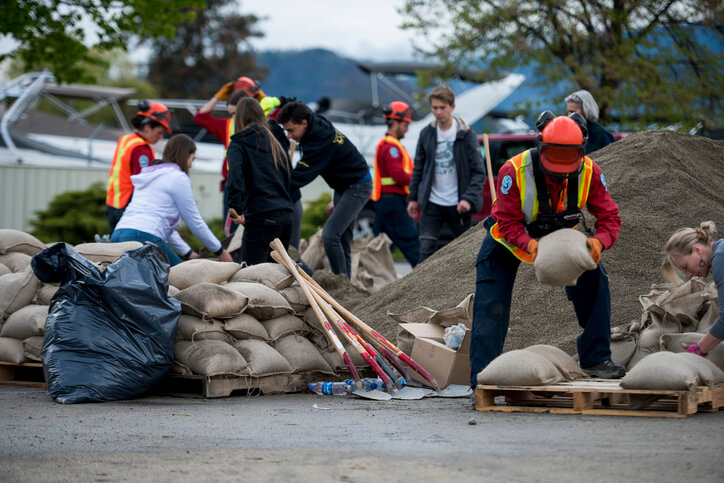
Media depictions of natural disaster preparedness tend to highlight immediate needs, such as clothing, food, shelter, and access to medical care. Long after the glaring lights of the news media have turned to another natural disaster, however, survivors of the previous disaster may continue to face health issues. First responders must prepare not only for the immediate effects of natural disasters, but also for the long-term health consequences. Here are the most common lingering effects of natural disasters.
Mental Health Issues
Natural disasters can upend a person’s entire existence in a few short hours. Between 15-75 percent of people who experience a natural disaster later develop PTSD. Natural disasters can also worsen existing mental health conditions such as depression, anxiety, and schizophrenia. Mental health conditions increase the risk of suicide, addiction, and other health woes. They may also complicate existing physical health conditions.
First responders must be prepared to respond to mental health emergencies. It’s also critically important to be sensitive to the needs of people with mental health conditions. Emergencies can be triggering for those with PTSD, and mental health conditions can make certain medical procedures frightening or traumatic. A gentle demeanor, a hefty dose of compassion, and a deep understanding of mental health can make treating those with mental illnesses much easier.
Infection
Infections increase both in the immediate aftermath of natural disasters and over the long term. Following Hurricane Katrina, 25 percent of deaths were due to injuries and trauma. Untreated injuries increase the risk of infection, and these infections can prove fatal if left untreated. They may also lead to lasting disabilities.
Following a natural disaster, lack of infrastructure can increase exposure to dangerous microbes. Contaminated water is a key culprit in gastrointestinal infections. Lack of medical care may also mean that fewer people are immunized, increasing the risk of outbreaks.
Worsening Chronic Medical Conditions
Chronic medical conditions tend to get worse following a natural disaster. This can be attributed to any of several factors, including:
- Lack of access to medication.
- Decreased access to medical care and support services.
- The effects of chronic stress on the body.
- Lifestyle changes. For example, diabetes tends to get worse following a natural disaster, due in part to lack of access to healthy food.
Following Hurricane Katrina, 14 percent of emergency healthcare visits were for the management of pre-existing chronic conditions. Most people who died during Hurricane Katrina were over the age of 74, pointing to the role of failing health and chronic conditions, and 11% of the deaths were due to heart conditions.
Poisoning
Poisoning rates increase following a natural disaster, and sometimes for years thereafter. This can further compound existing health problems or increase the risk of new ones. One study found that poisoning increased 10-year mortality even among those who survived the initial poisoning episode. Natural disasters increase the risk of poisoning by contributing to numerous problems, including:
- Increased exposure to pollution and environmental toxins.
- Dirty, contaminated water.
- Medication errors and interactions.
- Carbon monoxide poisoning, due in large part to generators and grills near the home.
- Drug abuse and misuse. Mental health issues in the wake of a natural disaster may lead to suicide attempts, or to misuse and abuse of prescription and nonprescription drugs.
First responders must partner with local poison control centers to educate residents about the perils of poisoning. Be prepared to promptly respond to poisoning episodes with emergency medical care, including appropriate airway management.
Infrastructure Loss
Perhaps the most devastating long-term health consequence of natural disasters is the loss of infrastructure. Roads may be damaged. Bridges and homes can collapse. Hospitals may lose power for extended periods or see entire wings destroyed by fire, flood, or wind. This creates a ripple effect, compromising access to healthcare, increasing the risk of injuries from car accidents and falls, and eroding healthcare quality. It can take years, or even decades, to repair infrastructure.
When equipment fails and infrastructure is lacking, airway emergencies become more pressing. The right portable emergency suction device helps you maintain a patent airway without a power source.
Editor's Note: This blog was originally published in May of 2019. It has been re-published with additional up to date content.














